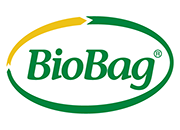FAQ
Frequently asked questions
What does composting mean?
The term compostable means that a material is compatible with a composting process. The European standard EN 13432 defines the characteristics a finished product must fulfil in order to be recovered through organic recovery. Compostable means that a material A, is biodegradable under composting conditions. B, disintegrates completely in one composting cycle. C, has no toxic effects and does not release heavy metals over a given value into the compost D, has no negative effect on the composting process itself.
What is the difference between compostable and biodegradable?
If a material is compostable it is automatically considered as biodegradable and can be recovered in a composting process. A biodegradable material will break down under the action of micro-organisms, but could leave residues after one composting cycle and no guarantee for toxic residues can be given. Therefore a biodegradable material cannot automatically be considered to be compostable before proof of its compostability has been given according to existing standards (EN13432).The term biodegradable is very often misused in marketing and advertising of products and materials that are not actually environmentally friendly. This is why BioBag more often uses the term compostable when describing our products. All of BioBag’s products are third-party certified compostable.
Are BioBags home compostable?
Home compostability is different from industrial compostability for two main reasons: 1) the temperatures reached by the waste inside the home composting bin are usually only a few centigrade degrees higher than the outside temperature, and this is true for short time periods (in industrial composting, the temperatures reach 50°C – with peaks of 60-70°C – for a number of months); 2) home composting bins are managed by amateurs, and the composting conditions might not always be ideal (in contrast, industrial composting plants are managed by qualified personnel, and kept under ideal working conditions). BioBags, most commonly used for managing waste are certified as “home compostable”, as they biodegrade at the temperature of the environment and in a home composting bin.
How long does it take for BioBags to start disintegrating in a landfill?
The conditions found in landfills (non-active, sealed landfills) are generally not conducive to biodegradation. As a consequence, Mater-Bi is expected not to contribute significantly to biogas formation in a landfill. This has been shown in a study carried out by Organic Waste systems.
How long time does it take before a compostable BioBag starts to disintegrate if it’s disposed of in the environment?
Littering should not be encouraged under any circumstances. If a compostable BioBag accidentally ends up in our environment, the biodegradation process depends on weather conditions (temperature, humidity) and how biological active the environment itself is.
Is it ethical to use starch to produce the raw material that BioBag is using?
Starch is a resource that is available to man, just like wood, coal and oil. However, these resources are no different from the point of view of their potential because they constitute a source of energy/raw material and therefore can be used for the same final purposes; oil can be used to produce fertilizers and fuel for tractors, which are necessary to produce food. As a result, oil can indirectly produce food. Therefore, whether or not using a particular resource is ethical or not, should not be determined by how it is used but by how it is obtained and exploited (quantities, geographical areas, extraction/cultivation methods, etc.)
Can BioBag products biodegrade on the shelf?
No. BioBag products will not biodegrade on the shelf. Biodegradation will only be initiated in a compost environment in the presence of micro-organisms, humidity and warmth. However, a BioBag product can over time, like any other material, lose some of its mechanical properties.
What advantages does this compostable bag give over a polyethylene bag?
Using biodegradable and compostable bags increases recovery options. In addition to recovering energy and recycling, organic recovery is also possible. Using raw materials technologies based on renewable resources becomes increasingly strategic as we move away from oil, a non-renewable resource.
How is a BioBag Compostable bag different from a traditional polyethylene plastic bag?
One of the primary differences between the BioBag compostable bag and conventional plastic bags is that the former does not last long. When it comes to traditional polythene bags, they are solely made from a non-renewable resource. On the other hand, BioBag products are made from a mixture of certified biodegradable and compostable polymers and starch. These bags will start to break down after getting exposed to microorganisms in a home or industrial compost environment and do not leave persistent microplastics behind.
What is a food waste caddy?
Food waste caddy is usually used in the kitchen to manage your food leftover. When using a food waste caddy, make sure you don’t put food packaging, pet waste, nappies, plastic bags, and liquids. Besides this, you should not put anything hot, always use a compostable liner, empty it often and close the lid. The best solution for sorting organic waste is to use a ventilated food waste caddy together with a compostable BioBag.
Are supermarket bags biodegradable?
Not all supermarket bags are biodegradable, as some of the retailers still use plastic shopping bags. These polythene bags are incredibly harmful to the environment and marine ecosystem because they live for years. However, some supermarkets have started to use compostable bags which have a multiple use as they can be reused to collect organic waste at home.
Are green produce bags compostable?
Green produce bags have a translucent mint green color, which signifies the industrial standard of biodegradable. These bags can decompose within 10-45 days under particular conditions. The best thing about compostable bags is that they do not leave persistent microplastics behind.




